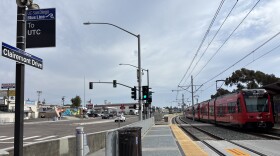New claims for unemployment benefits fell to their lowest level since the start of the year, but retail sales in September were down from 2008, indicating that consumers are reluctant to spend the economy out of recession.
It was the fourth drop in new claims in five weeks. But most analysts think the unemployment rate will keep rising well into next year, fueling a "jobless recovery" in which GDP grows slowly but new hiring lags. The current unemployment rate stands at 9.8 percent.
Employers are reluctant to bring on new workers until they are sure that demand for goods and services is on an upswing. But early September reports show sales are still falling for many retailers amid worries about jobs and tight credit, but many of the results came in better than expected.
Although a late Labor Day and delayed school openings led to better-than-expected sales figures, consumers held off spending their cash or running up more credit-card debt.
But amid the retail sales data, there were a few bright spots. Teen retailer Wet Seal Inc. and Macy's Inc. reported smaller-than-expected declines in sales at stores opened at least a year. The measure is considered a key indicator of a retailer's health. At Macy's, sales fell 2.3 percent from a year ago.
Limited Brands Inc. and accessories chain The Buckle Inc. both posted sales increases for the month. Buckle Inc. said its sales at stores open at least a year rose 5.1 percent, a bit lower than the 5.8 percent gain that Wall Street anticipated.
Still, "consumers remain under pressure on multiple fronts," said Ken Perkins, president of retail research firm Retail Metrics. "I don't think consumer spending is going to see a substantial uptick. Shoppers are concerned about rebuilding their balance sheets."
The Commerce Department also said Thursday that wholesale inventories fell by 1.3 percent in August, while sales at the wholesale level rose by a better-than-expected 1 percent. The data could indicate that retailers are starting to restock depleted shelves.
Meanwhile, the Labor Department said that new claims for unemployment insurance dropped last week to a seasonally adjusted 521,000, from the previous week's upwardly revised total of 554,000. It is better than the consensus forecast of 540,000 claims that Wall Street economists expected, according to a survey by Thomson Reuters.
The four-week average, which smooths fluctuations, fell to 539,750, the lowest since Jan. 17.
The number of people continuing to claim benefits declined by 72,000 to 6.04 million. The continuing-claims figure has remained stubbornly high and analysts expected it to resume a slight rise in coming months.
Congress has added up to 53 extra weeks of benefits on top of the 26 typically provided by the states, and is considering adding 13 more.
Many analysts say the economy grew as much as 3 percent in the July-September quarter, but most employers are expected to hold back on new hires while they wait to see if such growth can be maintained.
The unemployment rate rose to 9.8 percent in September from 9.7 percent a month earlier, the department said last week, as employers cut 263,000 jobs. The recession, the worst since the 1930s, has eliminated a net total of 7.2 million jobs.
Federal Reserve Chairman Ben Bernanke said last week that even if the economy maintained a 3 percent growth rate for several quarters, unemployment would still be above 9 percent by the end of 2010.
From NPR staff and wire reports
Copyright 2022 NPR. To see more, visit https://www.npr.org. 9(MDAzMjM2NDYzMDEyMzc1Njk5NjAxNzY3OQ001))






